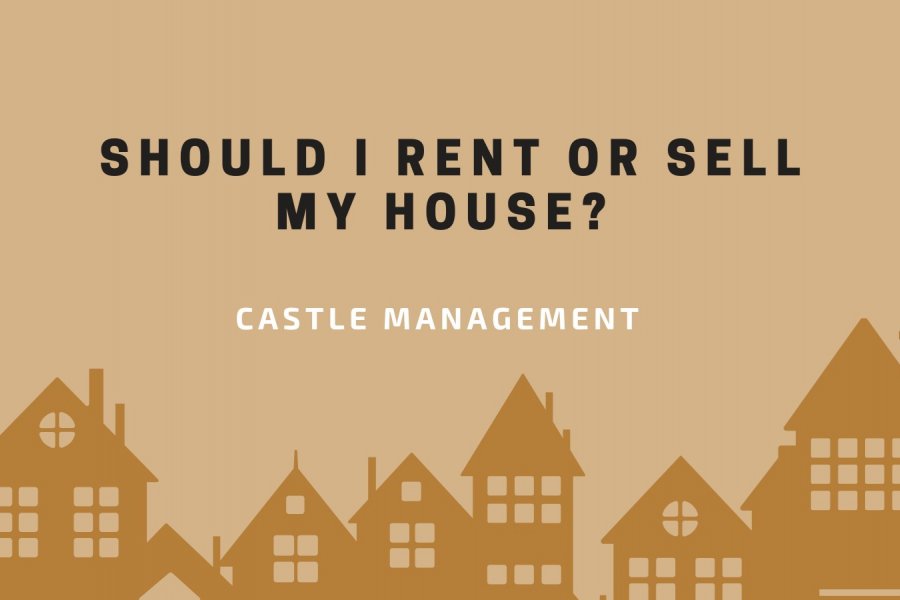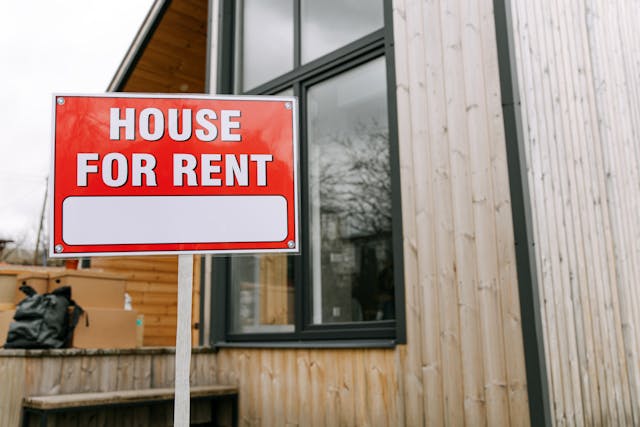
- Understand the Financial Impact: Whether renting or selling, carefully assess potential costs and profits, including mortgage, taxes, and management fees.
- Know the Market: Research local rental demand and market conditions to make an informed choice based on whether it’s a buyer’s or seller’s market.
- Evaluate Your Landlord Readiness: Ensure you’re prepared for responsibilities like tenant screening, maintenance, and legal compliance, or consider hiring a property manager.
Should you rent or sell your house? It’s a common question that many homeowners face at some point. Maybe you’re relocating, looking to downsize, or exploring ways to boost your income for retirement through real estate.
Whatever the reason, deciding whether to rent or sell can be challenging. The choice has long-term implications, so it’s important to weigh your options carefully.
In today’s blog, our experts at Castle Management walk you through tried and tested tips to help you make a confident, well-informed decision.
Learn How We Can Help You Maximize Your Home’s Potential!
Should I Rent or Sell My House? 6 Things to Consider
1. Financial Implications
If you choose to rent out your home instead of selling it, first and foremost, make sure it’s profitable. In other words, make sure that it generates a positive cash flow. This is where the rental income exceeds the expenses, such as mortgage, maintenance, and management fees.
When it comes to property taxes, make sure you analyze the costs. These tend to add up over time and can significantly impact your bottom line. Another thing that can have a financial implication on your bottom line is capital gains taxes.
2. Potential Costs
There is a cost attached to selling or renting out a home. Familiarizing yourself with the potential costs will help you make better decisions on which way to go.
Some of the costs of renting out a home include insurance, property taxes, repairs and maintenance, and re-renting expenses. Also, if you choose to hire a property manager, you’ll incur another cost as well.

When selling a house, common costs include advertising, staging, repairs, closing costs, and real estate agent fees. Generally, expect these to total between 9-10% of the unit’s sale price.
3. Prevailing Market Conditions
To make an informed decision on whether to sell or rent out your home, it’s also important to know about the local housing market conditions.
Begin by checking the rental demand in your area. Good indicators for this include vacancy rates, time on market, and rental prices. For example, when it comes to vacancy rates, the lower they are, the higher the demand.
To get such insights, you can take advantage of the numerous online research tools available. Alternatively, you could hire a property manager to help handle everything for you in this regard.
Another thing you’ll want to know is housing demand. Start by familiarizing yourself with the two main types of housing markets, seller’s market and buyer’s market.
In a seller’s market, the demand for housing is higher than the available properties. Consequently, this makes the prices for such homes go higher. This is undoubtedly a good time to sell your home to make a good profit.
However, the opposite is true during a buyer’s market. During this time, homes for sale are abundant, and there are not as many buyers in the market. This makes prices go down, making sellers make less profit.
Learn More About Castle Management!
4. Long-Term Rental vs. Short-Term Rental
Another thing to consider for sound decision-making is the type of tenancy you’ll be offering. There are two main types: long-term rental and short-term rental.

Long-term rentals are a popular choice among landlords for certain reasons. Including, providing more stability, having less turnover, and yielding predictable income.
That said, long-term rentals aren’t without their list of cons. For one, they may not provide you with flexibility when it comes to raising rent, as short-term rentals would. Also, you may need to invest significantly when it comes to maintenance.
As for short-term rentals, you can expect more flexibility with the lease terms and attract a wider pool of prospective tenants. That said, they require frequent maintenance and have high turnover rates.
Why Partner with Castle Management?
5. Landlord Responsibilities
If you decide to become a landlord, you’ll need to familiarize yourself with certain responsibilities. How well you master these can make or break your landlording career.
So, before deciding to become a landlord, make sure you ask yourself the following questions first.
- Will I be able to handle repair and maintenance requests from tenants on time?
- Which criteria will I use to screen prospective tenants?
- Do I have experience in marketing a rental property?
- Am I well-versed in the state’s landlord-tenant law?
- What does the Fair Housing Act entail?
Even if you answered “no” to everything, you can still succeed with the help of a good property manager. They can take care of everything from marketing and tenant screening to maintenance, repairs, legal compliance, and everything in between.

6. Rental Appeal
This is another thing you’ll want to consider when thinking of renting out your house. The rental market is in the service industry. Your potential tenants will always be looking for the right living standards that fit their lifestyles. And if you fail to meet these standards, you may have a difficult time appealing to them.
With that in mind, evaluate whether your property fits this criteria first before listing it for rent. Ask yourself the following questions.
- Is the property located in a desirable area?
- Does the property have desirable features and amenities, such as security, parking spaces, community gyms, or outdoor spaces?
- Is the rental market competitive? Research the overall demand and rental prices for comparable properties.
Discover Our Property Management Services!
Bottom Line
Deciding whether to rent or sell your home is a major decision, and having the right guidance can make all the difference. The best choice depends on your financial goals, lifestyle, and long-term plans.
At Castle Management, we’ve been helping Bay Area property owners navigate these decisions for nearly four decades. If you’re exploring your options, contact our team today. We’re here to help you make a confident and informed decision.
